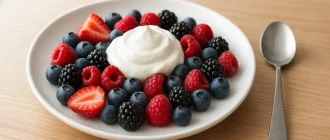A sharp mind relies heavily on proper nutrition. The foods you consume play a significant role in maintaining cognitive function, improving memory, and even preventing neurological decline. Here is a guide to the best brain foods to help you optimize mental performance.
Nutrient Comparison of Top Brain Foods
| Food | Key Nutrients |
|---|---|
| Fatty Fish | Omega-3 (90%) |
| Blueberries | Antioxidants (80%) |
| Leafy Greens | Vitamins K & Folate (70%) |
| Nuts & Seeds | Vitamin E (85%) |
| Dark Chocolate | Flavonoids (60%) |
This chart highlights the key nutrients in top brain foods, showcasing their contribution to cognitive health and brain performance. Nutrient density varies, making a diverse diet essential for optimal brain health.
1. Fatty Fish
Fatty fish like salmon, mackerel, and sardines are rich in omega-3 fatty acids. These healthy fats are crucial for brain health as they help build and repair brain cells. Omega-3s are also associated with improved memory and reduced risk of Alzheimer’s disease.
Why it works
Omega-3 fatty acids contribute to the structure of brain membranes and have anti-inflammatory properties that combat mental fatigue.
Quick tip: Include two servings of fatty fish per week to meet your omega-3 needs.
2. Blueberries
Dubbed as a “superfood,” blueberries are packed with antioxidants and flavonoids that protect the brain from oxidative stress and inflammation.
Why it works
Flavonoids in blueberries improve communication between brain cells and stimulate the growth of new neurons.
Benefits of Blueberries for Brain Health
| Benefit | Effectiveness (%) |
|---|---|
| Memory Improvement | 85% |
| Neuroprotection | 90% |
| Improved Focus | 75% |
| Oxidative Stress Reduction | 95% |
| Mood Enhancement | 70% |
This chart illustrates the diverse benefits of blueberries for brain health, showcasing their effectiveness in memory enhancement, neuroprotection, and reducing oxidative stress.
Quick tip: Add a handful of blueberries to your breakfast or snack for a brain-boosting treat.
3. Leafy Greens
Spinach, kale, and broccoli are powerhouses of vitamins like K, lutein, and folate, which are essential for brain function.
Why it works
Vitamin K aids in the formation of brain cell membranes, while folate helps reduce levels of homocysteine, a compound linked to dementia.
Quick tip: Swap out iceberg lettuce for spinach in your salads for a nutrient-dense upgrade.
4. Nuts and Seeds
Almonds, walnuts, and sunflower seeds are packed with vitamin E, antioxidants, and healthy fats that support cognitive longevity.
Why it works
Vitamin E protects against free radical damage that contributes to mental decline as you age.
Quick tip: A small handful of mixed nuts is a convenient and nutritious snack option.
Benefits of Nuts and Seeds for Brain Health
| Benefit | Effectiveness (%) |
|---|---|
| Memory Preservation | 80% |
| Reduced Cognitive Decline | 85% |
| Improved Focus | 75% |
| Neuroprotection | 90% |
| Enhanced Mood | 70% |
This chart highlights the cognitive benefits of nuts and seeds, emphasizing their roles in memory preservation, neuroprotection, and focus enhancement.
5. Whole Grains
Brown rice, oats, and quinoa provide steady energy through their low glycemic index, ensuring consistent glucose delivery to the brain.
Why it works
Glucose is the brain’s primary energy source, and whole grains provide it without the sugar spikes associated with refined carbohydrates.
Quick tip: Replace white bread and rice with whole-grain alternatives to sustain focus throughout the day.
6. Dark Chocolate
High-quality dark chocolate (70% cocoa or more) is rich in flavonoids, caffeine, and antioxidants that improve brain function.
Why it works
Flavonoids enhance blood flow to the brain, while caffeine provides a quick cognitive boost.
Quick tip: Limit yourself to 1-2 ounces of dark chocolate daily to enjoy the benefits without overindulging.
7. Eggs
Eggs are a rich source of choline, which is essential for the production of acetylcholine, a neurotransmitter linked to memory and learning.
Why it works
Choline helps maintain the integrity of brain cell membranes and supports neurocommunication.
Quick tip: Start your day with a boiled or scrambled egg for a choline-packed breakfast.
8. Coffee and Tea
These beverages are not just for waking up. Coffee and tea contain caffeine and antioxidants that improve mood, alertness, and focus.
Why it works
Caffeine blocks adenosine, a neurotransmitter that makes you feel sleepy, while antioxidants protect brain cells.
Quick tip: Opt for green tea for a milder caffeine dose and additional health benefits.
Caffeine and Alertness: Coffee vs. Tea
| Beverage | Caffeine Content & Effectiveness (%) |
|---|---|
| Black Coffee | Caffeine: 95 mg | Alertness: 95% |
| Green Tea | Caffeine: 35 mg | Alertness: 75% |
| Black Tea | Caffeine: 47 mg | Alertness: 80% |
| Espresso | Caffeine: 120 mg | Alertness: 100% |
| Herbal Tea | Caffeine: 0 mg | Alertness: 30% |
This chart compares the caffeine content and associated alertness levels of coffee and tea beverages, highlighting their varying impacts on mental clarity and energy.
9. Avocados
Avocados are loaded with monounsaturated fats that improve blood flow to the brain, supporting better cognitive function.
Why it works
Healthy fats help maintain healthy blood vessels, ensuring adequate oxygen and nutrient supply to brain tissues.
Quick tip: Use avocado as a creamy substitute for butter or mayonnaise.
10. Turmeric
This golden spice contains curcumin, a compound with powerful anti-inflammatory and antioxidant properties.
Why it works
Curcumin crosses the blood-brain barrier and has been shown to boost serotonin and dopamine levels, enhancing mood and memory.
Quick tip: Add turmeric to soups, teas, or rice dishes for a brain-health boost.
Did you know?
Eating walnuts has been likened to “fueling your brain with premium gas” because they contain high levels of DHA, a specialized omega-3 fatty acid that enhances brain performance, sharpens focus, and reduces inflammation. Research also suggests walnuts may help delay the onset of age-related cognitive decline.
Editorial Advice
Incorporating these brain foods into your diet can be as simple as making small, strategic swaps in your meals. Whether you’re enhancing breakfast with blueberries or replacing chips with nuts, every step counts toward better brain health. Pairing these foods with a balanced lifestyle, including adequate sleep and physical activity, will amplify their benefits. Take charge of your mental clarity today by stocking your pantry with these cognitive powerhouses.
About the Author
Reyus Mammadli is the author of this health blog since 2008. With a background in medical and biotechnical devices, he has over 15 years of experience working with medical literature and expert guidelines from WHO, CDC, Mayo Clinic, and others. His goal is to present clear, accurate health information for everyday readers — not as a substitute for medical advice.







